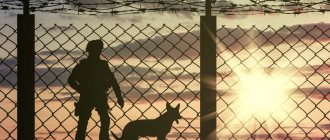HomeInformationThe Prosecutor's Office informs the Legal status of the Prosecutor's Office, tasks, functions and powers of the Prosecutor's Office
Legal status of the prosecutor's office, tasks, functions and powers of the prosecutor's office
Published: 08/02/2021
In accordance with Art. 1 of the Law on the Prosecutor's Office, the prosecutor's office is a unified federal centralized system of bodies exercising, on behalf of the Russian Federation, supervision over compliance with the Constitution of the Russian Federation and the implementation of laws in force on the territory of the Russian Federation.
The peculiarity of its status is that the main goals of prosecutorial activity are to ensure the rule of law, unity and strengthening of the rule of law, protection of human and civil rights and freedoms, as well as legally protected interests of society and the state. This indicates not only the importance of the prosecutor’s office for the state, society and the individual citizen, but also places increased demands on prosecutors, as well as on the legislation on the prosecutor’s office. This determines the constitutional settlement of the fundamentals of the status of the prosecutorial system of the Russian Federation.
This is confirmed by the fact that the President of the Russian Federation V.V. within the framework of the draft law of the Russian Federation on an amendment to the Constitution of the Russian Federation “On improving the regulation of certain issues of the organization of public power” submitted to the State Duma of the Federal Assembly of the Russian Federation on January 20, 2020, attention is paid to the prosecutor’s office.
Currently, the Constitution of the Russian Federation provides for Article 129, which is found in Chapter 7 entitled “Judicial power and the prosecutor’s office.” Until 2014, this chapter was called “Judicial Power”.
Thus, the special independent status of the prosecutor’s office in the system of other state institutions is indicated, and the increased social significance of prosecutorial activities is noted.
Article 129 of the Constitution of the Russian Federation consists of five parts, which are devoted to the regulation of organizational issues primarily related to the appointment and dismissal of prosecutors in the status of heads of prosecutorial bodies.
Thus, in accordance with part two of this article, the Prosecutor General of the Russian Federation and all his deputies are appointed to and dismissed from office by the Federation Council upon the proposal of the President of the Russian Federation.
Prosecutors of the constituent entities of the Russian Federation, as defined by part three of this article, are appointed to the position by the President of the Russian Federation on the proposal of the Prosecutor General of the Russian Federation, agreed with the constituent entities of the Russian Federation. The decision to dismiss these prosecutors is also made by the President.
Specialized prosecutors with the same status as prosecutors of constituent entities of the Russian Federation are appointed and dismissed by the President of the Russian Federation.
According to Part 5 of Article 129 of the Constitution of the Russian Federation, the appointment and dismissal of prosecutors of cities, districts and equivalent prosecutors is under the jurisdiction of the Prosecutor General of the Russian Federation.
In addition, Part 1 of Article 129 of the Constitution of the Russian Federation stipulates that the powers, organization and procedure for the activities of the prosecutor's office of the Russian Federation are determined by federal law.
Attention should be paid to another important constitutional norm - this is paragraph “o” of Article 71, which establishes that the prosecutor’s office is under the exclusive jurisdiction of the Russian Federation (that is, the federal center). Consequently, establishing the status of the prosecutor’s office and assigning its functions should be carried out precisely at the federal level.
These constitutional provisions are fully consistent with the legislative requirements established in Art. 3 of the Federal Law “On the Prosecutor’s Office of the Russian Federation”, which provides that the Prosecutor’s Office of the Russian Federation cannot be entrusted with performing functions not provided for by federal laws.
The main functions of prosecutors include: - supervision over the implementation of laws by federal executive authorities, the Investigative Committee of the Russian Federation, representative (legislative) and executive bodies of the constituent entities of the Russian Federation, local government bodies, military administration bodies, control bodies, their officials, subjects of public control over ensuring human rights in places of forced detention and assistance to persons in places of forced detention by management bodies and heads of commercial and non-profit organizations, as well as compliance with the laws of legal acts issued by them; – supervision over the observance of human and civil rights and freedoms by federal executive authorities, the Investigative Committee of the Russian Federation, representative (legislative) and executive bodies of the constituent entities of the Russian Federation, local government bodies, military administration bodies, control bodies, their officials, subjects of public control over ensuring human rights in places of forced detention and assistance to persons in places of forced detention, as well as management bodies and heads of commercial and non-profit organizations; – supervision over the implementation of laws by bodies carrying out operational investigative activities, inquiry and preliminary investigation; – supervision over the implementation of laws by bailiffs; – supervision over the implementation of laws by the administrations of bodies and institutions executing punishment and compulsory measures imposed by the court, by the administrations of places of detention of detainees and prisoners; – criminal prosecution in accordance with the powers established by the criminal procedural legislation of the Russian Federation; – coordination of the activities of law enforcement agencies to combat crime; – initiating cases of administrative offenses and conducting administrative investigations in accordance with the powers established by the Code of Administrative Offenses of the Russian Federation and other federal laws; – participation in the consideration of cases by courts; – participation in law-making activities. By virtue of Art. 9 of the Law on the Prosecutor's Office, when establishing in the course of the exercise of his powers the need to improve existing normative legal acts, he has the right to submit to legislative bodies and bodies with the right of legislative initiative, at the corresponding and lower levels, proposals for changes, additions, repeals or adoption of laws and other regulatory legal acts. And also, in the course of exercising its powers, in the manner established by the Prosecutor General’s Office of Russia and according to the methodology determined by the Government of the Russian Federation, it conducts an anti-corruption examination of regulatory legal acts (Order of the Prosecutor General’s Office of Russia dated December 28, 2009 N 400 “On organizing an anti-corruption examination of regulatory legal acts”).
The prosecutor's office, in accordance with their powers, resolves statements, complaints and other requests containing information about violations of laws (Article 10 of the Law on the Prosecutor's Office).
In the current Federal Law “On the Prosecutor’s Office of the Russian Federation,” supervision over the observance of human and civil rights and freedoms is highlighted as an independent area of activity of the prosecutor’s office, which confirms the importance of its human rights role at the present stage of development of our country. The human rights potential of the prosecutor's office is manifested both in the diverse activities of monitoring the observance of constitutional rights and freedoms of man and citizen, and in the significant preventive focus of supervisory activities carried out in various spheres of life of the state and society.
The human rights function of the prosecutor's office generally manifests itself in the protection and restoration of violated human and civil rights and freedoms, in resolving appeals from citizens and organizations, receiving citizens, and protecting the rights of entrepreneurs.
The supervisory functions of the prosecutor's office include: supervision over the implementation of laws; supervision over the observance of human and civil rights and freedoms; supervision over the implementation of laws by bodies carrying out operational investigative activities, preliminary investigation and inquiry; supervision over the implementation of laws by bailiffs; supervision in the field of execution of criminal penalties.
The law-making function of the prosecutor's office includes the participation of prosecutors in meetings of federal legislative and executive bodies, representative (legislative) and executive bodies of the constituent entities of the Russian Federation, local government bodies, the participation of the prosecutor's office in the law-making activities of state authorities and local government bodies, including through the implementation of the right of legislative (rule-making) initiative (Articles 7 and 9).
The coordination function is organizationally enshrined in Article 8 of the Law on the Prosecutor's Office and consists of coordinating the activities of law enforcement agencies to combat crime and interdepartmental interaction.
Judicial functions are performed by the prosecutor's office when supporting the state prosecution in court, as well as in cases of mandatory participation of the prosecutor in criminal, civil, arbitration, and administrative proceedings (Section IV. Participation of the prosecutor in the consideration of cases by the courts).
The information and educational functions of the prosecutor's office are to implement the principle of transparency enshrined in paragraph 2 of Art. 4 of the Law on the Prosecutor's Office, and are implemented by informing state authorities, local governments, as well as the population about the state of the rule of law, speaking in the media, interacting with civil society institutions, carrying out work on legal education and clarification of legislation.
In addition, the General Prosecutor's Office of the Russian Federation, within its competence, performs international legal functions: it carries out direct communications with the relevant authorities of other states and international organizations, cooperates with them, enters into agreements on issues of legal assistance and the fight against crime, participates in the development of international treaties of the Russian Federation. Federation, in the extradition of criminals (Article 2).
Based on the provisions of paragraph 1 of Art. 11 of the Law on the Prosecutor's Office, scientific and educational organizations included in the prosecutor's office system (Academy of the Prosecutor General's Office of the Russian Federation, institutes and branches of the Academy) carry out the functions of training qualified legal personnel and scientific support of prosecutorial activities.
Thus, a distinctive feature of the legal status of the Russian prosecutor's office is the variety of forms of prosecutorial activity, mechanisms and methods of interaction with the highest bodies of state power, judicial bodies, local governments, international organizations and other subjects of legal relations, which determines the increasing role of the prosecutor's office in the implementation of the legal policy of the state , at the same time, the prosecutor's office ceases to be a criminal prosecution body (the existing powers in the criminal legal sphere are actually reduced to supervisory, coordination and judicial functions), which once again emphasizes the constitutional value and human rights nature of the activities of this state legal institution.
Senior Assistant Prosecutor of the Nakhimovsky District of the City of Sevastopol S.A. informs. Surma
Activities of the prosecutor's office in the field of anti-corruption
This work is regulated by the Constitution of the Russian Federation, federal legislation and a special National Plan approved by the head of state.
The Special Prosecutor's Office of the Prosecutor's Office is a unit that supervises compliance with laws in the area of combating this crime. Such bodies exist not only in the Prosecutor General’s Office, but also in divisions of the constituent entities of the Russian Federation.
Activities to combat this crime, prevention and powers include the following:
- Formation of an intolerant position in the public environment towards corrupt behavior.
- Conducting an examination of regulatory legal acts and draft laws.
- Presentation of qualification requirements for persons applying for state and municipal positions.
- Corruption in the prosecutor's office is a common phenomenon, which means that prevention should be carried out in this area.
- Improving the mechanisms of public and parliamentary control over the implementation of laws of the Russian Federation.
Prevention of corruption in the prosecutor's office
The prevention of economic crimes within the supervisory authority itself is of no small importance. For this purpose, special requirements are imposed on persons applying for positions. Thus, the candidate’s personality is carefully studied; he must have professional qualities and an impeccable reputation.
To be appointed to a position in the SPK, a candidate must have at least five years of work experience in the prosecutor's office. Consideration of applicants is carried out by a special commission.
Control over the activities of the SPC is carried out by the department that monitors compliance with anti-corruption legislation. The operational management of these employees lies with the prosecutors of the country's constituent entities.
Thus, in Russia there is an independent vertical structure of bodies to combat violations of the law in the economic sphere. The autonomy guarantees established for employees enable them to successfully perform their assigned duties.


